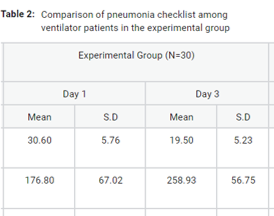Abstract
Oral care is significant as it influences both health and clinical consequences of escalated care patients. Oropharyngeal intrusion by microorganisms is basic being developed of nosocomial pneumonia (ventilator-associated pneumonia/VAP) in intensive care units. The present study aims to assess the effectiveness of nesting on posture comfort among low birth weight babies. A quantitative quasi-experimental research design was conducted among 60 ventilator supported patients in which 30 were allotted to experimental and 30 to control group. Observational sampling- checklist technique was used to select samples. A semi-structured interview was used to collect demographic data, and pneumonia checklist was assessed. Selected samples on 1st day of intubation in the experimental group and were provided oral care with 0.2% chlorhexidine every 6th hourly till 3rd day (72hours) and maintained pneumonia checklist respiratory rate, PaO2, BUN value, WBC count, platelet count and temperature. For the selected samples of the control group, oral care procedure was not applied. The study finding clearly infers that there was a significant difference in the Day 13 scores of pneumonia checklist variables except for temperature between the experimental and control group which proves the effectiveness of oral care on bacterial colonization and ventilator associated pneumonia in the experimental group than the patients in the control group who had undergone normal hospital routine measures.
Full text article
Authors

This work is licensed under a Creative Commons Attribution-NonCommercial-NoDerivatives 4.0 International License.

